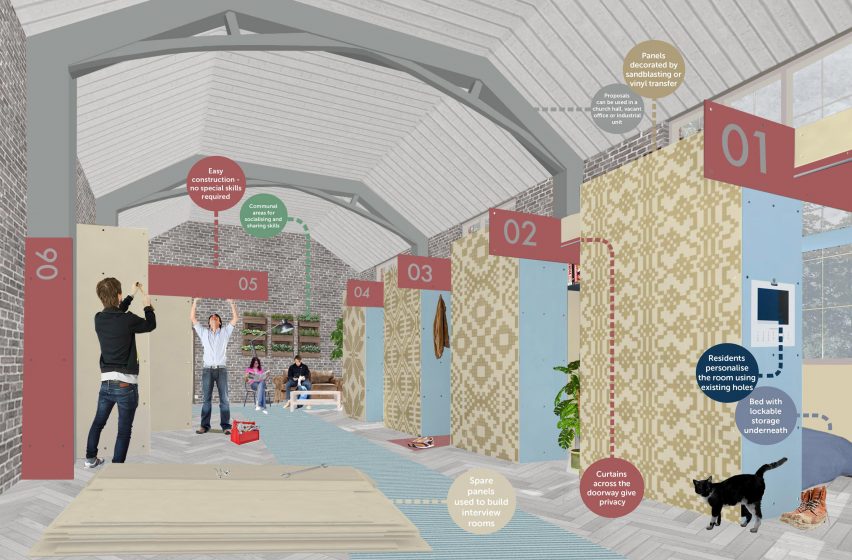Cladding panels removed from high-rise buildings are repurposed to build temporary homes for Romanian migrant workers in this proposal by architecture studio Reed Watts, which has just been named winner of a charity-organised design competition.
Called The Flat Pack, the design envisions the Trespa cladding panels that currently cover a pair of tower blocks in the London borough of Enfield, but which are set to be removed imminently, finding a second life as the walls of tiny dwellings for migrants.
Unlike other high-rises in London, where flammable panels are being removed in reaction to the tragedy at Grenfell Tower, the two Enfield blocks are having their cladding removed as part of a wider refurbishment programme.
These non-flammable panels are in good condition, according to Reed Watts founders Matt Watts and Jim Reed, and this proposal could prevent them going to waste.
"Rather than letting the panels be sent to landfill or incinerated, the project proposes that they be re-used in a creative way," Watts told Dezeen.
The Starter For Ten contest, organised by UK charity Commonweal Housing, called for architects to propose alternative living spaces for Romanian migrant workers who are currently forced to set up camp in public parks or underpasses.
The brief asked for ideas for how these workers could be provided with safe places to reside on a short-term basis.
Reed Watts' winning proposal involves using the repurposed panels to build tiny dwellings, containing only a bed and a dressing area – similar in size to a tent, but more stable and secure.
These "low-tech pods" could be installed inside disused buildings. They could also be grouped together to create communities of families and friends.
"The shelters will allow organisations to provide personal, adaptable bedrooms with minimal financial outlay in different locations, for instance, a local community hall, vacant office or industrial building," said Watts.
"Working frugally with the panels available, we have designed a module that will allow us to create 12 cohorts of eight rooms – space for 96 people. The modules can be built in a few minutes and arranged in different configurations to suit the location," he continued.
"With the exception of a new mattress, fixings and fabric for curtains, each shelter would be built entirely from reclaimed materials. The curtain provides privacy, while a lockable box under each bed would provide a secure store for residents' possessions."
Occupants would also be able to customise their temporary home. For instance, etched patterns could be sand-blasted into the surface of the panels, while pictures, mirrors, shelves or coat hooks could be fixed into existing holes.
"Boards could easily be cleaned or replaced if one gets damaged, by simply unscrewing a few bolts. And when the occupant leaves, the room could be easily disassembled and potentially repurposed," said the team.
"Rather than explore complex or expensive technological solutions, we felt it important to propose an idea that can be realised almost immediately with little cost or design development. The raw materials exist and the design can easily be tailored to suit other sheet materials that might become available in the future."
According to recent research, more than 1,500 Romanian immigrants were sleeping rough in London alone last year – largely due to the lack of affordable rental properties in the city. It was this that prompted Commonweal Housing to launch the contest.
"When we launched this competition we didn't know what the right housing solution to address the social injustices associated with this very specific group of migrant workers might look like," explained Russ Edwards, a trustee for the charity and a driving force behind the competition.
"It is fantastic that the brief captured the imaginations of the design fraternity in such a way," he said.
"In particular, the designers' ability to address the specific challenges associated with the group of working migrants the competition aimed to support, moving beyond the functional requirements in the brief, is to be commended."

